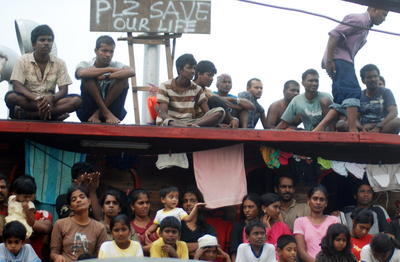In early 2008 the Rudd government abolished the Pacific Solution and shifted all offshore processing to Christmas Island.
As Christmas Island was still excised from the Australian migration zone, those landing there were not eligible to apply for any visa. Although, due to Australia’s status as a signatory to the 1951 Refugee Convention, it was required to assess asylum claims and provide protection if the person was found to have a well-founded fear of persecution. This determination was made by a departmental official, and if the asylum seeker was found to be in need of protection a recommendation was made to the Minister for Immigration to lift the ban on applying for a visa. Unlike those who applied for asylum on the mainland, unsuccessful claimants had few options for review.
In response to the High Court decision that this system denied asylum seekers on Christmas Island procedural fairness, the government has announced that it is changing the offshore processing system. These changes will come into effect on 1 March 2011, and will provide those who seek asylum on excised islands more avenues of review and, importantly, the opportunity to appeal to the Australian court system if they receive a negative finding. But it should be noted that there continues to be a slight difference in the process for those seeking protection on the mainland compared to those on excised territories.
The policy of excision was introduced to prevent asylum seekers who did not reach the Australian mainland from gaining access to the various avenues of appeal guaranteed to onshore applicants. The High Court decision has in effect found that those asylum seekers who reach Christmas Island, and other islands that have been excised from the migration zone, should have the opportunity to have any negative findings reviewed. This means that one of the primary reasons for excising islands from the migration zone has disappeared.
Following the High Court decision the opposition continued their calls for the processing centre on Nauru to be reopened and the recommencement of the Pacific Solution. If the government is adamant that they do not want to process all asylum seekers intercepted as onshore applicants, then such a change would achieve this. Of course, this also would mean that asylum seekers are processed in a country that is not currently a signatory to the Refugee Convention (although Nauru has said that it is prepared to become one if needed) and is therefore not bound by its requirements.
However, while the government has been steadfast in its opposition to the reopening of the Nauru processing centre, it has proposed a similar solution. In July 2010, the newly-installed Prime Minister Julia Gillard announced her intention to negotiate the opening of a regional processing centre in Timor Leste, one of the few countries in the region that is a signatory to the 1951 Convention. If this were to get the go ahead from the Timorese government it would mean that asylum seekers intercepted on their way to Australia would be transported there for processing. If found to have refugee status, they would then await resettlement in a third country.
The options for the Australian government appear to be to either accept its responsibilities to asylum seekers as outlined in the 1951 Convention or to continue with the policy of offshore processing and find another country to host a processing centre. Given the government and opposition both continue to view offshore processing as essential, and the High Court has ruled that asylum seekers processed on an excised territory must be provided with the option of judicial review, it appears the government will need to find another country in the region willing to process asylum seekers on Australia’s behalf. Whether this will be a sustainable outcome will ultimately depend on whether Australia and other countries are willing to resettle those asylum seekers found to be owed protection. Otherwise people found to be in need of protection may remain in limbo for years, and Australia will continue to be seen as failing to meet its international obligations regarding refugees.
Andrew Herd is a PhD scholar at the School of Politics and International Relations at the Australian National University.

